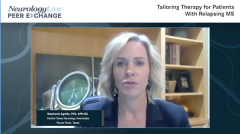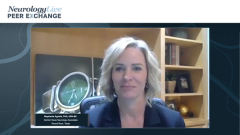
Risk of Relapse/Progression in MS
A discussion on the integration of newer therapies, like cladribine, into the treatment landscape for relapsing multiple sclerosis (MS), and insight regarding what is currently understood about risks of disease progression and relapse.
Episodes in this series

Transcript:
Amy Perrin Ross, APN, MSN, CNRN, MSCN: One of the points that you discussed that struck a cord with me was the concept of secondary progressive MS [multiple sclerosis], and the fact that, since the ORACLE-MS trial has come out, we have now seen this, and other disease-modifying therapies, being approved, not only for relapsing-remitting MS, but also for secondary progressive MS that is active in adults. Some of the data from this trial, as well as others, has pointed to the fact that people can—and do—have a progressive component to their disease, yet they may still be at risk for relapse. People have often asked, “I haven’t had relapse in 8 years, how do I know I still have it?” and “What’s the concept of progression?” This data gives us some insight into the answers to some of those questions.
Patricia Melville, RN, MSN, NP-C, MSCN: The diagnosis of secondary progressive MS can often be delayed because none of us have crystal balls, and we don’t have biomarkers. Sometimes I approach it that way when I see a patient that may be slipping into that category, or into that subtype—I often want to quote unquote tune them up. Maybe I need to maximize their symptomatic therapies. Maybe I need to get them into a good physical therapy program. Maybe I need to improve their mood or their sleep. Or maybe there are other comorbidities that are not being properly managed or looked after. We all approach it that way because we don’t want to give that label to our patients because we know that while active secondary progressive MS, there’s still some inflammation going on that we can hang on to and treat. We know that the prognosis is not as good, frankly. I always try to inspire hope in our patients as well.
Amy Perrin Ross, APN, MSN, CNRN, MSCN: Thank you all so much. I would like to thank this wonderful panel, Christen Kutz, Stephanie Agrella, Bryan Walker, and Patricia Melville for this wonderful discussion. I’d like to thank you, as an audience, for watching NeurologyLive® Peer Exchange. If you enjoyed the content, I suggest that you subscribe to the NeurologyLive® newsletters to receive information about upcoming Peer Exchange segments and other content available to you. Thank you all so much.
Transcript edited for clarity.
Newsletter
Keep your finger on the pulse of neurology—subscribe to NeurologyLive for expert interviews, new data, and breakthrough treatment updates.

















